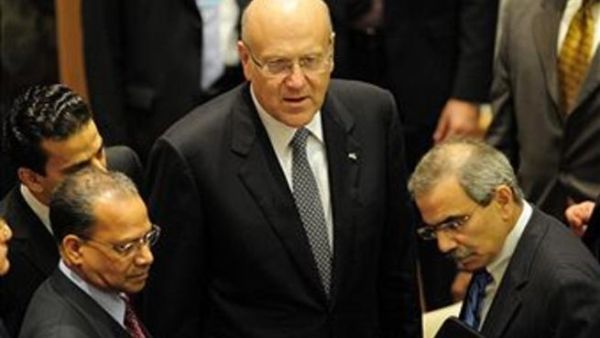Lebanon’s economy is expected to shrink dramatically if the government of Prime Minister Najib Mikati resigned in the coming days or weeks due to deep differences over the international tribunal funding, economists and bankers warned Monday. “The economy will certainly suffer a big blow if the government resigns. We need to have a government even if this Cabinet had certain weaknesses,” economist Ghazi Wazneh told The Daily Star.
Mikati has threatened to resign as premier if the ministers refuse his request to pay Lebanon’s share in the tribunal, warning that the country would be subjected to crippling economic sanctions if Beirut fails to meet its international obligations.
The prospects of resignation has caused deep alarm among economists, bankers, businessmen and traders who already complain of weak economic indicators this year as a result of the deteriorating security and political conditions in neighboring Syria and the government’s inability to address crucial social and livelihood issues.
Some economists did not even rule out that the country’s GDP growth may fall to zero in 2012 from 2-3 percent this year if the government turned into a caretaker Cabinet. Merchants and traders may see the volume of business fall drastically as consumers will become more reluctant to spend any money on luxury items, especially during this Christmas season.
If this happens, then imports from Beirut port and other key outlets will see a decline in volume and value and this will translate into an acute decrease in government revenues. “All government investment projects will be put on hold until further notice if the government collapses. All the allocations for electricity, water and dam projects will be scrapped because a caretaker Cabinet has no authority to execute these projects,” Wazneh said.
The government has failed to approve the 2012 draft budget due to strong objections from many ministers over the planned new taxes. Finance Minister Mohammad Safadi called for raising the value added tax from 10 to 12 percent and proposed increasing taxes on interest rates on customer deposits from 5 to 8 percent. However, these taxes sparked outrage among labor unions and merchants alike, warning that such taxes would trigger a spiraling inflation and above all deal a blow to consumer confidence.
Wazneh said a collapse of the government would also mean that Lebanon would remain without an official budget for the sixth year running. “Labor unions and employees who were pinning hope that Labor Minister Charbel Nahhas will submit a proposal to raise wages by 17 percent may soon realize that their dream for better living conditions will go down the drain if the Cabinet resigns in the coming few days,” another economist said.
There is a general consensus among many financial experts and economists that domestic problems are far more catastrophic on the economy than the impact of the Syrian situation on Lebanon. Observers caution that potential investors will surely scrap all plans to make any investments in Lebanon. “A caretaker government cannot issue any decree or license for investors to start projects in Lebanon. This will definitely shrink foreign direct investment,” Wazneh explained. But some bankers seemed confident that even in the likelihood of a government collapse, the banking sector will not be affected.
“I don’t think the government will fall soon but nevertheless even if this happens our banks will not be affected because this sector is highly regulated and closely monitored by the Central Bank,” said Joe Sarrouh, the adviser to the chairman of Fransabank. But he acknowledged that the possible fall of the government may bring some uncertainty to the market that also might trigger slower economic growth. “Who has an interest under these adverse economic conditions to be responsible for the collapse of the government?” Sarrouh asked. He stressed that there would not be any problems for Lebanon in financing the public debt next year even if the government were to resign. He noted that the Lebanese government had successfully rolled over outstanding Eurobonds and treasury bills without any problem.
Sarrouh also expressed confidence on the strength of the Lebanese pound, noting that the Central Bank was sitting on more than $33 billion in foreign currency reserves. “Lebanon has enough muscle to weather any unforeseen crisis thanks to these reserves,” the banker said. But apart from the upbeat outlook of the monetary situation, most other economic indicators, according to economists, will surely suffer as a direct result of a possible collapse in Mikati’s government.








